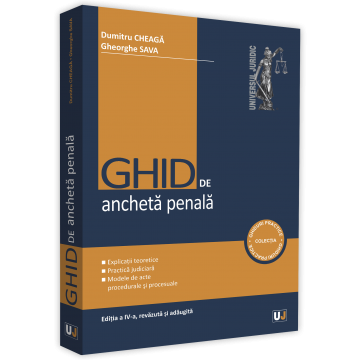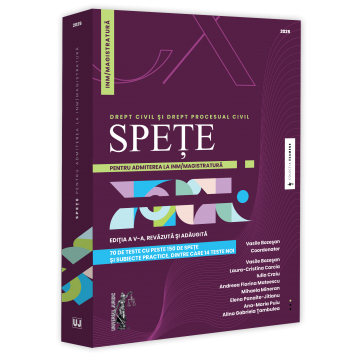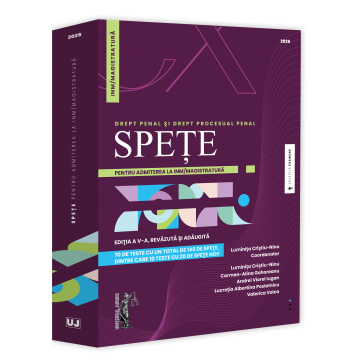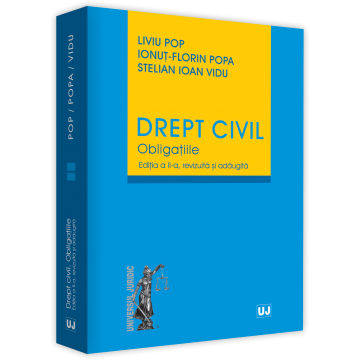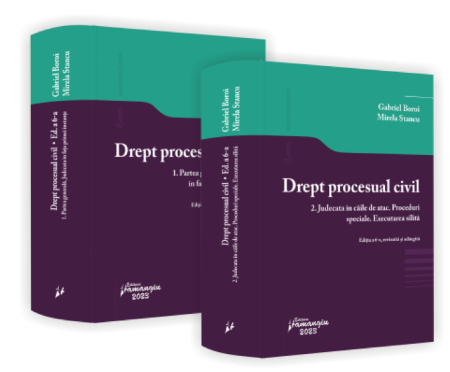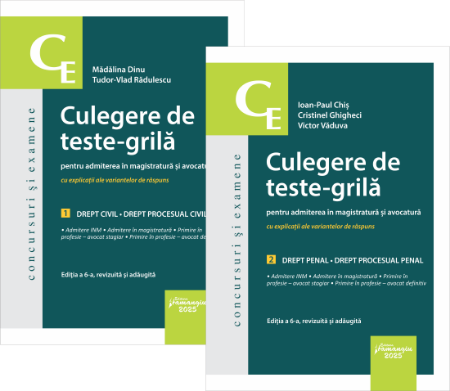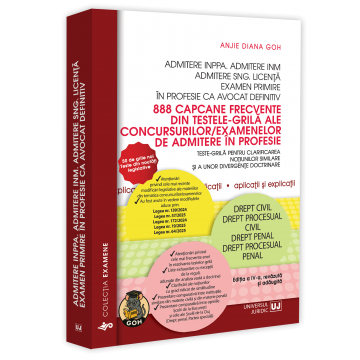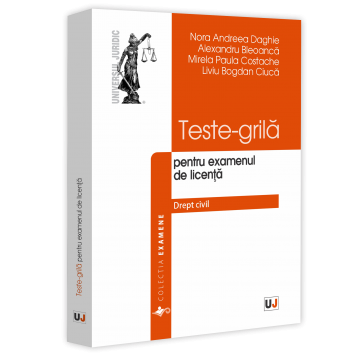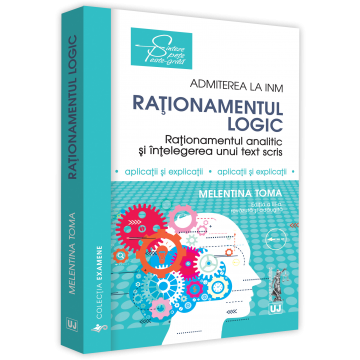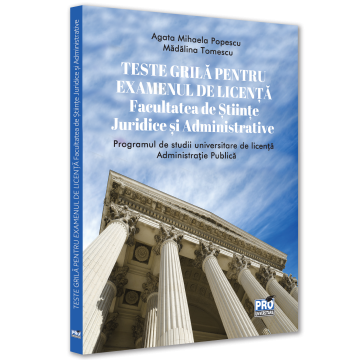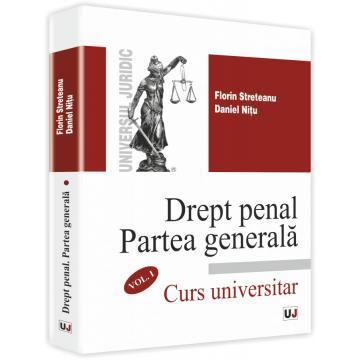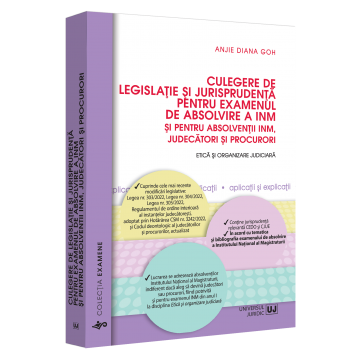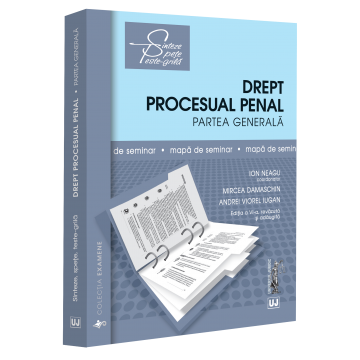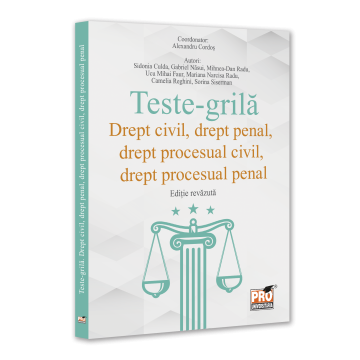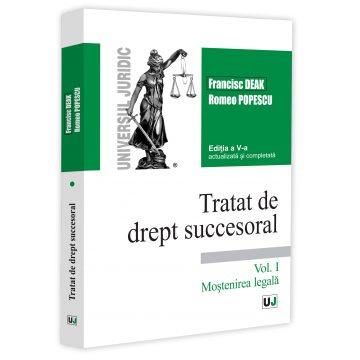ISBN: 978-606-28-0985-0
DOI: 10.5682/9786062809850
Publisher year: 2019
Pages: 324
Publisher: Editura Universitară
Author: Dragos Calin, Ciprian Coada
Edition: I
- Description
- Download (1)
- Authors
- Content
- More details
- Reviews (0)
Authority is an attribute of power, specific to the forms of state organization, conferred by law and non-state organizational forms, which compete to promote and defend the general interests of society.
From this prestige, which must be enjoyed by all these organizations, depends to a large extent the proper exercise of the entrusted attributions, according to the law, and the development in good conditions of the activity of these forms of state and non-state organization. That is why the criminal law defends the attribute of the authority against all the facts that harm it, incriminating as crimes those deviations from the norms of conduct by which the specific prestige of public positions is affected and sanctioning them in relation to their gravity.
Responding to current legislative challenges and practical needs, this collection aims to bring to the attention of a number of recent jurisprudential aspects that will help theorists and legal professionals, able to answer no. not only the immediate needs of information, but also the need to bring to the attention of the public those topical issues that judicial practice faces.
-
ULTRAJUL JUDICIAR. JURISPRUDENTA RECENTA
Download
DRAGOS CALIN
Judge at the Bucharest Court of Appeal, trainer of the National Institute of Magistracy for continuous professional training European Union law, international judicial cooperation in civil and commercial matters, labor law and social insurance law; associate scientific researcher of the Institute of Legal Research of the Romanian Academy - Center for European Law Studies, director of the Journal of the Judges Forum, member of the scientific college of the journal Jurisclasor ECHR, co-editor of the Journal iaduer.ro - European Legal Affairs, founding member and co-president Romanian Judges Forum Association (2007-present), member of the GEMME Europe Board of Directors (May 2010-present), vice-president of GEMME Europe - European Grouping of Magistrates for Mediation (May 2010-May 2012), founding member of CIMJ International Conference on Mediation for Justice), October 2009, Paris
CIPRIAN COADA
Brief introduction / 11
1. Public instigation in a continuous form and judicial outrage in a continuous form. Publishing on a blog some texts that contain messages inciting violence against judges, for the purpose of intimidation or revenge. Frequent use by the defendant of expressions such as "to burn at the stake", "to kill them", "to be executed", "to be raped", "burned with a cigarette", "burned with acid on the face", " tortured ”etc., exhortations meant to determine an aggressive attitude of the public towards the magistrates who pronounced the decisions condemning some political and football leaders / 16
Ploiesti Court of Appeal, Criminal Section and for cases with minors and family, Decision no. 901 of September 12, 2017
2. Publication of a video on the social network Facebook, in the content of which the defendant utters threats against four magistrates and urges the public to commit violent crimes against them, causing them a state of fear or discomfort, grafted, in especially, on the fact that the investigations carried out at the level of the law enforcement bodies have drawn a violent personal profile of the defendant, meets the constitutive elements of the offenses of judicial outrage / 38
Braila Court, Criminal Section, criminal sentence no. 1069 of June 14, 2018
3. Judicial outrage. Frequent online comments, with insulting and threatening content, not only on the life of the injured person, but also on the lives of their children, likely to inspire the injured person, judge, a real and serious fear, objectively credible statements, in the conditions under which they come from a person against whom the injured person has pronounced a solution of conviction / 49
Suceava Court of Appeal, Criminal Section and for cases with minors, Criminal Decision no. 568 of May 26, 2017
4. Judicial outrage. The threat, based on the same criminal resolution, repeatedly, of a person committing acts of violence, in connection with the acts exercised by him as chief prosecutor, for the purpose of intimidation and revenge, creating a state of concrete fear for his life / 86
Galati Court of Appeal, Criminal Section and for cases with minors, Criminal Decision no. 279 of March 9, 2017
5. Judicial outrage. Threats exercised for the purpose of intimidation and revenge on a prosecutor in the exercise of his duties. Hitting a prosecutor in the courtroom / 107
Timisoara Court, Criminal Section, Criminal Sentence no. 3196 of October 14, 2016
6. Judicial outrage. Following a judge on the street after the end of the work schedule, addressing them all along the route, in a loud, loud tone, insulting words, insults and curses that could create a state of fear. The utterance of insulting words ("wretched", "thieves", "scoundrels", "ordinary scoundrels", "bullshit" and others) and curses on some judges / 115
Pitesti Court of Appeal, Criminal and Juvenile Cases Section, Criminal Decision no. 345 of April 8, 2019
7. Judicial outrage. Insulting words addressed by a defendant to a prosecutor during the hearing in the prosecutor's office ("bandit", "filth", "criminal", "robber", stating that when he goes out, "solve it") / 144
District 6 Court of Bucharest, Criminal sentence no. 242 of May 16, 2015
8. Judicial outrage. Addressing a defendant in public, in a harsh and recalcitrant tone, gesturing closely and with a raised hand, to a prosecutor, accusing him of wrongfully imprisoning him because of him and using expressions such as "I will take care of you" , „I will arrange you” / 151
Cluj Court of Appeal, Criminal and Juvenile Section, Criminal Decision no. 879 of May 30, 2017
9. Judicial outrage. Sending by e-mail, to a court, a letter in which a judge was nominated, containing the words "death to judges and wretched auxiliaries. Some cowards and complexes… you didn't manage to fool me with words, let's go to the slaughterhouse! ”, A message that had a folder attached containing the image of a knife / 158
Sfantu Gheorghe Court, Criminal sentence no. 116 of November 1, 2016
10. The threat, by a detainee, inside the penitentiary, of a judge supervising the deprivation of liberty within the same penitentiary, in the exercise of his duties, in the sense that he will make him pay for the five months of postponement after will release from the penitentiary, a threat that was likely to provoke the injured person a state of fear meets the constitutive elements of the crime of judicial outrage / 178
Brasov Court of Appeal, Criminal decision no. 153 of March 1, 2017
11. Judicial outrage and violation of the solemnity of the hearing. The utterance of a defendant, in the courtroom, of insults to the full court, in obscene, threatening words, in a high and offensive tone. The threats referred to the consequences that will be borne by those who continue to extend the preventive measure after serving their sentence / 188
Cluj-Napoca Court, Criminal sentence no. 2068 of June 20, 2018
12. Addressing, by a detainee, in telephone conversations with a prosecutor in the exercise of his duties, repeatedly, obscene words and expressions with sexual connotations, creating a real state of fear fueled and amplified by frequency and the content of the appeals, in order to intimidate her and to take revenge for the solution adopted in a file / 197
Deva Court, Criminal Section, Criminal Sentence no. 1225 of December 28, 2016
13. Judicial outrage. The defendant's act of slamming the folder on the desk where the prosecutor was sitting, while he is exercising his duties, bending over him, shouting and insulting, meets the essential elements of the crime of judicial outrage, constituting aggressive manifestations that produced a state of fear for the victim / 205
Brasov Court of Appeal, Criminal Section, Criminal Decision no. 795 of December 5, 2018
14. Judicial outrage. Sending threatening messages to a judge who ordered the arrest of the defendant: "I will catch you on the street and kill you", "I will take revenge on you and your family", "I will destroy you, I will hunt you like a rabbit" , as well as trivial expressions / 242
Filiasi Court, Criminal sentence no. 114 of December 20, 2018
15. Judicial outrage. The threat of a prosecutor by a defendant to the fact that the next crime he will commit will be rape, the victim of which will be the prosecutor himself / 253
Baia Mare Court, Criminal sentence no. 3789 of December 20, 2018
16. Judicial outrage. Letter from a detainee to a judge who rejected a lawsuit, threatening his life, that of his family members, as well as threatening to destroy his property, the threats being made for revenge in connection with the exercise of his duties. service of the injured person / 259
Oradea Court, Criminal sentence no. 347 of March 18, 2016
17. Judicial outrage. Addressing, at the headquarters of the prosecutor's office, directly, threats with the commission of a crime (death threats) against a prosecutor in the exercise of his / her duties / 267
Miercurea Ciuc Court, Criminal sentence no. 637 of July 12, 2017
18. The defendant's act of catching and pulling a lawyer's hair, until it became unbalanced and fell to the ground, causing traumatic injuries, for which he required a number of 3-4 days of medical care for healing, in order to take revenge on him, as a result of his duties as a lawyer, meets the constitutive elements of the crime of judicial outrage / 277
Brasov Court of Appeal, Criminal Section, Criminal Decision no. 181 of March 10, 2016
19. The act of the defendant to threaten the injured party with death and arson of his property, this being a lawyer employed by the defendant's ex-wife and her mother in several civil proceedings, which had as object divorce and division actions, the defendant taking into account hand a knife with a blade of about 30 cm, meets the constituent elements of the crime of judicial outrage / 280
Targu Jiu Court, Criminal Section, Criminal Sentence no. 1223 of June 14, 2017
20. Addressing by a defendant, in the seat of a court, offensive expressions and words to some lawyers, threatening them with death and stating that he bought a gun that he will unload
in their head and will no longer use paralyzing spray / 295
Ploiesti Court of Appeal, Criminal Section and for cases with minors and family, Criminal Decision no. 1223 of October 20, 2016
21. Judicial outrage. Hitting a lawyer with his fist on the shoulder when leaving the courtroom / 311
Alba Iulia Court of Appeal, Criminal and Juvenile Cases Section, Criminal Decision no. 52 of January 22, 2015
Authority is an attribute of power, specific to forms of state organization, conferred by law and non-state organizational forms, which compete to promote and defend the general interests of society.
From this prestige, which must be enjoyed by all these organizations, depends to a large extent the proper exercise of the entrusted attributions, according to the law, and the development in good conditions of the activity of these forms of state and non-state organization.
That is why the criminal law defends the attribute of the authority against all the facts that harm it, incriminating as crimes those deviations from the norms of conduct by which the specific prestige of public positions is affected and sanctioning them in relation to their gravity.
Among these deeds, a particularly important place is occupied by the crime of outrage, which aims to defend those persons who perform a function involving the exercise of state authority against any harm to their dignity, mental freedom and physical integrity, for deeds committed or activities related to the exercise of the function.
Aiming to ensure the prestige of the state authority against such manifestations, along with the crime of outrage, the Criminal Code criminalized by the provisions of art.279, the crime of judicial outrage, within Title IV of the Special Part, dedicated to crimes against justice.
According to the provisions of art.279 paragraph 1 of the Criminal Code, the threat, hitting or other violence, bodily injury, beatings or injuries causing death or murder, committed against a judge or prosecutor in the exercise of his duties are sanctioned with the penalty provided by law for that offense, the special limits of which are increased by half. The provisions of art.279 paragraph 2 of the Criminal Code stipulate that the commission of a crime against a judge or prosecutor or against his property, this time, for the purpose of intimidation or revenge, in connection with the exercise of official duties, is punishable by the penalty provided by law for that offense, the special limits of which are increased by half. According to paragraph 3 of art. 279 of the Criminal Code, the same punishment is sanctioned for acts committed under the conditions of paragraph 2, if they concern a family member of the judge or prosecutor. Finally, according to the final paragraph of the text of the law, the provisions of paragraphs 1-3 also apply to acts committed against a lawyer in connection with the exercise of the profession.
The Criminal Code of 1968 regulates these categories of deeds in the crime of outrage, provided by art.239 and art.2391, together with those addressed to criminal investigation bodies, experts, bailiffs, police, gendarmes, military, husband or close relatives of these persons, together with the rest of the facts directed against the authority, within Title V of the Special Part.
The new Criminal Code abandoned the model offered by the previous Criminal Code, for reasons related to the importance and specifics of the new regulations, the legislator justifying his option in stating reasons by arguments related to the need for more effective protection of social values protected by criminal law .
According to the initiators of the normative act, the justification for the distinct incrimination of the crime of judicial outrage over the crime of outrage consists in the fact that, by the will of the law, the judge, prosecutor or lawyer have the most important judicial attributions. of the course of a trial and its outcome, so that ensuring increased protection against some forms of violence against them is, from this perspective, justified.
Since this distinction is also found in the French Criminal Code (art. 433-3) and the Italian Criminal Code (art. 341 and art. 343), the reason why this special version of outrage was incriminated separately, and not as an aggravating circumstance of the crime against the authority, is related to the widening of its scope of protection, in relation to the previous regulation, by including of state referred to in art.257 of the Criminal Code, as are lawyers.
Another novelty is that of paragraph 2 of art.279 of the Criminal Code, and it is related to the commission of the crime against a judge or prosecutor or against his property, for the purpose of intimidation or revenge, in connection with the exercise of service, this special provision not being provided by the previous Criminal Code, under the rule of which the deeds committed for this purpose were classified as common law crimes (for example, home invasion, destruction, etc.).
Responding to current legislative challenges and practical needs, this collection aims to bring to the forefront a number of recent jurisprudential issues that come to the aid of theorists and legal professionals, able to respond not only to immediate information needs, but and the need to bring to the public's attention those topical issues that judicial practice faces.
The current jurisprudential examination comes to complete the palette of a well-established case law among practitioners, but which was no longer able to respond to those legislative changes that led to the reconfiguration of the normative content of the crime of outrage and which obviously wanted to be deepened. -a broader perspective, that of legal professionals.
The novelty, number and diversity of the presented situations also call into question the need for increased protection that the legislator should grant to the values protected by criminal law, the current judicial phenomenon registering a visible resurgence, encouraged by the multiplication of communication channels and relaxation of criminal treatment. years, which influences the behavior of persons in conflict with criminal law.
That is why the thematic jurisprudence is intended to be a signal addressed to some decision makers, who, in a bad period of our history, were concerned to give as much efficiency as possible to the principle of humanism in criminal law, but not in the evolutionary sense, to protect as much as possible the social values protected by the criminal law, but in an involuntary and oriented sense, quite visible, in order to weaken the state authority and encourage this type of crime.
In fact, the fact that some crimes are consumed in different locations reserved for justice is evidence in the sense of what is shown, and the fact that the facts that are the subject of many threats are serious crimes only complies with this sad reality. That this is the case is also proved by the fact that the perpetrators of such deeds no longer hide behind fictitious identities or anonymous messages, but want to make themselves known, formulating messages, letters, engaging in telephone conversations or discussions on social networks. socialization, in which they make known their plans and intentions for revenge and in which they unload emotionally, in the most obvious way possible.
The collection of judicial practice dedicated to judicial outrage proves one more thing, namely that these facts diversify from year to year, taking place not only in the classic variants, known to legal practitioners, but also in the virtual environment, which is why the authors have sought to bring to the attention of those interested a series of cases, in which incitement to violence in the online space has become a way of manifestation, meant to attract new followers.
These types of messages are thus preferred to those propagated orally, because they are likely to ensure a much wider spread among the public, having a deeper social impact, helping to promote a negative mood in terms of safety climate. publishes, by promoting and encouraging behavioral patterns.
Along with messages, in the virtual environment there are other types of communications, somewhat more sophisticated, meant to have an impact among the young population, more prone to learning negative patterns of behavior, such as comments and videos, meant to promote their authors and make them better known among the communities they come from.
Obviously, this presentation does not lack the deeds committed by means of oral or written communication, various in terms of their typology, most of which present themselves as threats addressed in connection with the performance of duties and which sometimes they are committed even during the exercise of these attributions, inside some spaces reserved for the act of justice or near such locations.
Of course, although fewer in number, there are also acts committed with violence, starting with those of a verbal nature, but which, accompanied by tools that could be used as weapons, are likely to cause greater fear to the injured and continuing with those of a physical nature, committed for the purpose of revenge for the quality of the consultancy services provided or the failure in the legal activities provided by certain lawyers.
All these circumstances that have enjoyed the attention of the judiciary are described in detail, for the best possible understanding of the factual situation, by presenting a procedural dynamic of each case, reproducing the arguments that formed the court's conviction, but also those that were removed, the identification data of the parties and other persons involved in the execution of the act of justice being anonymized, the selected court decisions being taken from the portal httpwww.rolii.ro and easily adapted for reading fluency.
In this context, the collection of judicial practice is a good guide, which deserves due attention from practitioners and theorists of law, as it analyzes in detail aspects related to the correct application of the law by the judiciary, such as of individualization of the punishment or the way in which the elements that integrate the constitutive content of the crime are analyzed in different particular situations.
Of course, due to the exhaustive presentation, the process of assessing the evidence in each of the situations can be deepened by readers, who have the opportunity to reflect on how to resolve the criminal and civil side, based on a set of elements, allowing them to properly evaluate the evidence proposed in the indictment or defense.
Last but not least, by presenting some aspects specific to each case, regarding the evidentiary procedures and methods or the process of collecting, administering and assessing the evidence, the collection can prove its usefulness not only in terms of substantial criminal law, but also in terms of criminal procedural law. , those interested in the technical side of the phenomenon having available, indirectly, a series of information in the field of related sciences, such as criminology and criminology, benefiting from a complete picture of the crime of judicial outrage, from a double perspective, theoretical and application.
Finally, we hope that this creative effort will not remain idle, but will even be the source of proposals to improve our criminal law, so hard tried in recent years, especially that the forms of manifestation of human behavior are constantly changing. , and many of the forms of response from the state are precarious and lack the efficiency that the recipients of the right wanted.
The authors 'effort occurs against the background of strong turmoil on the public stage, the Professional Association of the Romanian Judges' Forum being involved in a continuous effort to defend the rule of law. This bayonet battle, specific in some places to a guerrilla war, involved and still involves numerous sacrifices, less known to the general public, accustomed to the end product of an intellectual work deposited during hundreds of sleepless nights, but equally aspirant of genuine democratic values.

6359.png)
![Judicial Outrage. Recent Jurisprudence [1] Judicial Outrage. Recent Jurisprudence [1]](https://gomagcdn.ro/domains/editurauniversitara.ro/files/product/large/ultrajul-judiciar-jurisprudenta-recenta-80-489631.jpg)
